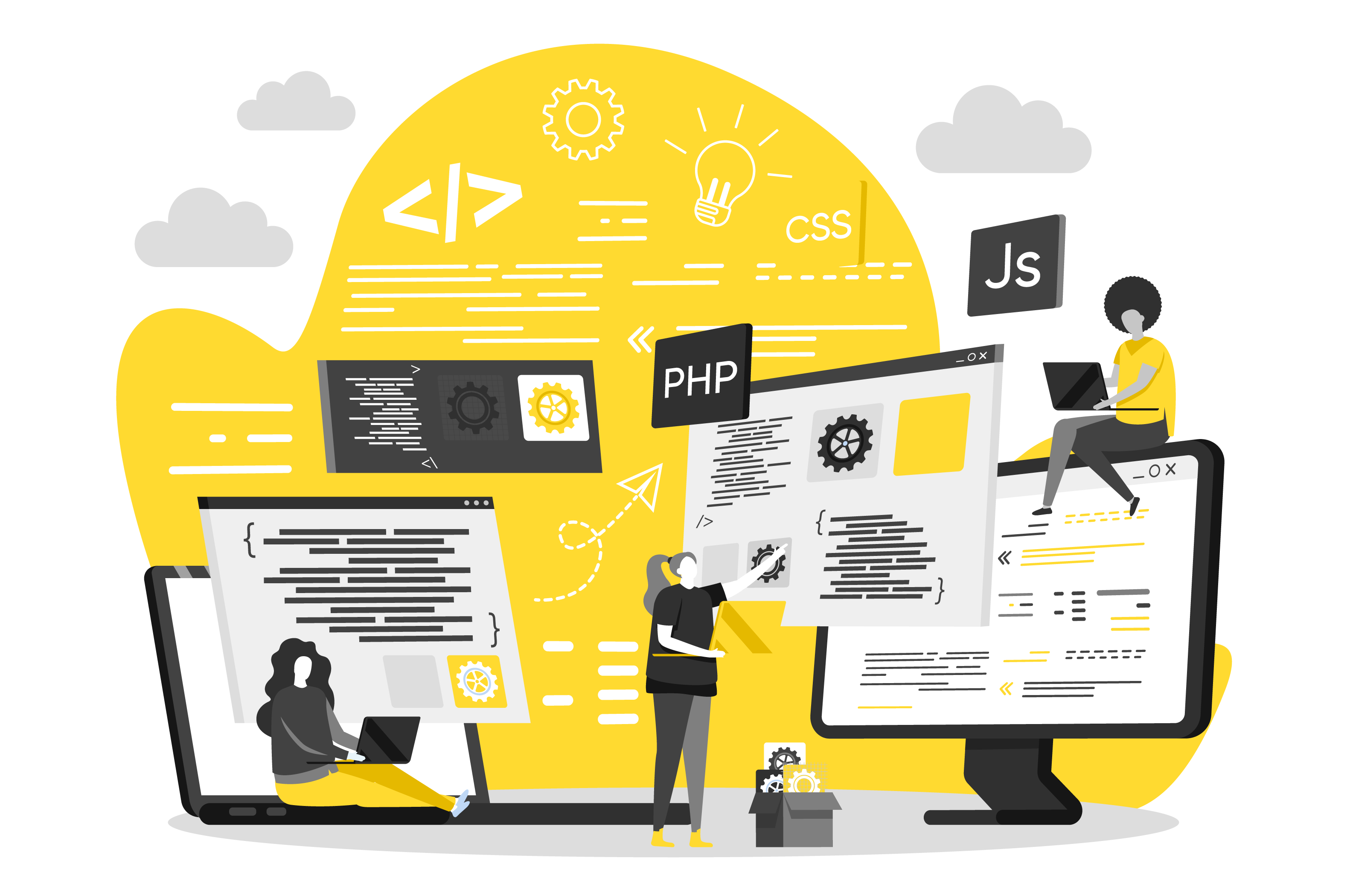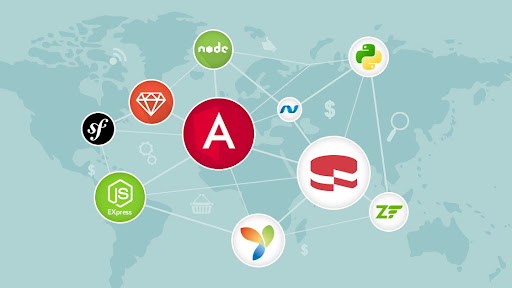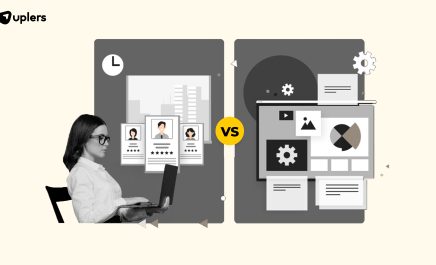Identifying the Best Web Development Framework for Your Business Needs
- Sheryl Jones
- December 16, 2021
- 9 Minute Read

Web development framework serves as the resource pool for designers and web developers to create user-friendly websites. It is basically a game plan that makes strategizing easier and searching for tools simpler while you are deep into the developmental process.
Choosing the right web framework is a very subjective process. Depending on what the website is for, what kind of usage it will see, and what the developer’s skill level is, your development framework might need to be changed. After all, your goal is not to display your skills but to make the development process easy and as effortless as possible.
In recent years, several web development frameworks have been developed that improve, optimize, and polish the website creation process. Now, you no longer have to code everything from scratch or spend months developing and reinventing the steps. Rather, you can use this time to add new features and make the website more responsive.

Having a fast and reliable website is crucial for running an online business or even creating an online presence for a local business – since web development frameworks cover aspects like database access, code source. Authentication, session management, and so on help you cross a major hurdle during website creation.
What Is a Web Development Framework?
A web development framework is a software framework that supports the development of websites and applications, including web resources, APIs, and services. With web frameworks, you can achieve a standard process to build and deploy web applications on the internet.
Basically, it consists of a set of tools or resources that come together to support your software development process, like files, folders, and basics of coding. There are different types of web frameworks, with their own functions, capabilities, and advantages. But all of them act as a guide for developers to create a web design.
Some examples of web frameworks include Laravel, Spring. Vue.js. CakePHP, CodeIgniter, Symfony4, etc. You can use these frameworks to:
- Simplify the web design process
- Generate HTTP requests and responses
- Send requests to the correct handler
- Increase the speed of web designing
- Make the application creation process smooth and fast
Why Your Business Needs a Web Development Framework
A web framework acts as a tool in the web application development process. It is usually a set of models that make agile application development easier with its predefined libraries and functions. This helps developers to focus on unique problems and not spend countless hours reinventing the wheel and implementing functions that might be readily available.
There are several other aspects to having a web development framework while creating a website for your business.
Organized Code
You can control the order of the code and organize files right from the start, if you have a development framework. Any framework, whether for PHP or Java, has a defined structure and is very useful for updates and maintenance for years to come.
No Reinvention Required
Frameworks already have solutions to some of the common problems that web developers might face. They contain functions for authentication, access control, cookies, sessions, module files, Request and Answer Management, form and data validation, etc. You do not have to waste time on these if you use a framework.
Input and Output Security
There are several functions like website vulnerability testing that ensure the input and output data of your website remains secure from potential attacks. Rather than manually adding these functions and covering all security aspects, you can simply use existing functions from the framework.
MVC Architecture
The best web framework for PHP development should have a Model – View – Controller pattern. The Model presents the data structure through an interface, the View visually represents the content on templates of web pages and output data, and the Controller controls user requests, database communication, and HTML view.
Employment Opportunities
Any technical employee who knows how to work with web development frameworks will have access to a larger labor pool. If your developer is well-versed in this process, you can expect higher quality of work, lower learning curve, and better adaptability at work from them.
Community Support
All development frameworks have communities of developers whom you can reach through online forums, emails, or specific platforms, like StackOverflow, GitHub, etc. This way, you will get development tips and solutions to complex problems easily. Frameworks also foster teamwork, collaboration, and a positive spirit as you have to work with frontend developers, backend programmers, database specialists, etc.

Popular Web Development Framework Types
Now that you understand why a framework is important in website design and development, you should also know the popular types of web development frameworks in the market today. Apart from the following six, there are several other web frameworks as well, which may be suitable for your specific project.
Laravel
Laravel is a free and open-source web development framework based on PHP and intended for developing websites with the Model – View – Controller architecture mentioned earlier. It has an “expressive, elegant syntax” created by Taylor Otwell and is based on Symfony.
PHP being one of the most popular web languages, Laravel is greatly useful for business web development functions. It helps you make websites with simple and readable structure, and features like database ORM, cache storage, etc.
Spring
Spring is another framework with the MVC pattern that uses Java with JVM-based systems to create websites that have high performance. Designers can create simple and portable applications with the JavaScript backend framework that can act as standalone platforms. You can develop and launch websites using this framework with minimal configuration.
Vue.js
Vue.js is an open-source frontend JavaScript framework that can be used for building user interfaces and single-page applications. It is flexible and allows the integration of third-party solutions for data binding. Vue.js is best for designers who are looking to build simple, lightweight applications that need high speed and performance.
Symfony4
Symfony4 is one of the most popular development frameworks that designers recommend. It has numerous reusable components and an active community that provides new codes and regular updates. It has an MIT license, practices information control, creates apps in different languages, and sustains a stable environment for development.
CodeIgniter
CodeIgniter lets you build dynamic websites based on PHP with the MVC architecture. It requires zero configuration and can integrate numerous functions and features into the websites, without the need to configure each feature individually. It is best for businesses looking for a quicker launch and streamlined solution.
Ruby on Rails
This web application framework works with the Ruby language in the MVC pattern and enables faster development than a typical Java framework. It lets you design database-type websites with proper organization and use tools that are pre-configured and readily available. It is a great choice for beginners and people looking to build fast and simple websites.
Some other notable web development frameworks include Express, ASP.NET, Django, Ember, Flask, etc.
How to Identify the Best Web Development Framework for Your Business
There are several factors involved in identifying the best web development framework for your business. Let us discuss some of them here.
Usage
Depending on what your web application will be used for, you can determine which is the right framework for you. You need a framework if you do not have time to implement a proper system or learn it from scratch but you need a properly separated UI. This also depends on the kind of work expected and features required on the website.
If your application is dependent on CRUD operations, you would need a suitable framework. If your application must be ready in a week or so, you need a framework that you know how to understand and implement quickly. Similar usage factors play an important role in your decision.
Software Pattern
The software partner of a framework influences the project. Almost every framework in the market uses the MVC pattern. This helps you write tighter and more accurate code. However, you can opt for other patterns as well. Some other patterns of software are MVP, MVA, and AVC.
MVP stands for Model – View – Presenter, MVA stands for Model – View – Adapter, and AVC stands for Application – View – Controller.
License
License is a crucial factor while developing a web application. Though most frameworks let you have a commercial license, some might not allow you to distribute the application commercially after building it. If your website is for commercial purposes, make sure you check the framework license conditions before choosing one.
Also, check licenses for extensions, plug-ins, and other associated functionalities. This will save you the time and hassle of dealing with restricted licenses after the application has been developed.
Hosting Requirements
The requirements of the business often come before what the developer envisions for a project. For instance, the developer might lean towards the best and latest technologies but they first need to check the hosting requirements of the project. If a dedicated host is beyond the budget, you must settle with shared hosting and its settings.
Some frameworks that offer shared hosting are CodeIgniter, Kohana, CakePHP, etc. On the other hand, frameworks with non-traditional setups include Django, Ruby on Rails, Pylons, and other non-PHP frameworks.

Learning Curve
Every framework has its own learning curve. The best backend framework for your business is the one whose learning curve suits your timetable and skill level. Depending on the flexibility and conventions of a web framework, you must decide which one suits your requirements.
Some factors to be considered here are language, feature implementation, directory structure, naming conventions, and whether you need to learn just about the framework or the language itself.
Core Library
Availability of a core library is one of the biggest advantages of a web framework. While choosing the suitable option for your business, consider what kind of resources you will get at the library, whether you will have to write repetitive code, and what kind of customizations and implementations it supports.
A core library should cover authentication and authorization. AJAX, caching, data validation and sanitization, URL mapping, and templating. Now, if you prefer a framework that will give bare minimum support and maximum control, you should choose accordingly.
An ideal framework should let you swap the parts you do not like and add additional features on top. Pylon lets you change the ORM as well as the templating language for your benefit. So, decide whether you would prefer a loosely coupled framework or a rigid one.
Testing and Scaling
Unit testing, the practice of verifying and validating software by testing individual units of source code, is a beneficial aspect to have in your framework. It lets you test core parts of the application without tampering with the rest and creating a mess. Frameworks like CodeIgniter and Zend have this feature.
Next is scalability. Although that has more to do with I/O and network latency, it is always great to have a framework that has minimal scaling problems. However, if a framework suits all your other requirements and you are thinking of rejecting it based on scalability, think again. You can optimize the code to reduce this issue, but it mostly lies outside the scope of a framework.
Documentation
The most popular backend frameworks all have detailed documentation for the user. This aspect is important as it attracts power users and expands the user base of the framework gradually. If the documentation is inadequate or shoddy, developers would find it difficult to follow and work with it.
Choose a framework that has elaborate documentation, with details, examples, sample code, tutorials, articles, and snippets to help you figure out issues when you get stuck somewhere.
Updates and Bug Fixes
If you do not want to be in charge of fixing bugs and updates regularly, you should choose a big framework that has dedicated programmers working on these issues every day. For instance, a Python backend framework with its own community will identify and fix bugs as soon as possible, without it being a headache.
Choosing the right framework involves checking that it is not stagnant and its vulnerabilities are explored and fixed regularly. Frequent updates, transparency about bugs, and a developer community backup are valuable things to have in a framework.

Ease of Installation, Extension, and Availability
The framework you choose must be easy to install, at the least. Unless you are willing to work hard for installation and extension, you should choose a generic model that can be repurposed into other components later.
Identify the framework that would let you perform extensions without fuss. It must also have available plug-ins for additional functions. This will save you the effort to create a custom extension from scratch. This way, you can get important work done easily and quickly.
Conclusion
If you keep the above aspects in mind, you will automatically be able to identify the best web development framework that suits your business needs without taking a chunk out of your annual budget. After all, a web framework is the base of all developmental work and will set the tone and quality of your web application for years to come.

Thank you for submitting the details!
We will keep your information safe. Feel free to contact us with any questions at hello@uplers.com
Please check your email for next steps shared by Robert.


















